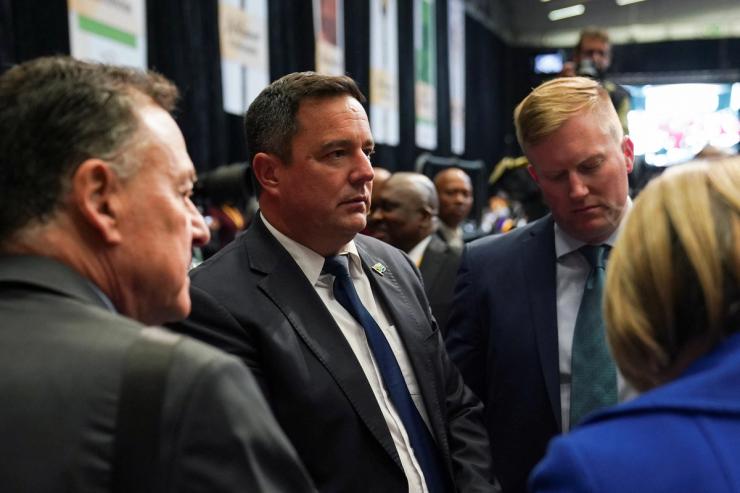The News
JOHANNESBURG — Talks between South Africa’s two biggest parties about forming a coalition cabinet were plunged into jeopardy after disagreements between the African National Congress and the Democratic Alliance over ministerial roles, according to people involved in the negotiations.
Leaders of the DA, the country’s second biggest party, have been angered by leaks of confidential letters and what they say is deal-breaking conduct by their ANC counterparts.
The ANC was forced to form a coalition government after failing to secure a simple majority in South Africa’s election last month. The center-right DA won the second largest share of the vote in the election and the two parties, traditionally foes, agreed to form a coalition with smaller parties. That enabled ANC leader President Cyril Ramaphosa to become the leader of Africa’s biggest economy for five more years.
But, following disagreements over ministerial roles and high profile leaks about the negotiations, DA Chair Helen Zille on Thursday told the party’s leaders to prepare to walk away from the landmark deal struck with the ANC this month.
“If we cannot get meaningful portfolios that make it possible for us to fulfill our commitment to our country, then we’d rather remain five more years in opposition until we become the biggest party and then we can determine the frame,” she said in a meeting on Thursday, a DA official familiar with the internal discussion told Semafor Africa.
Sam’s view
The talks are on a knife edge amid increasing animosity between the DA and the ANC.
There’s a lot at stake for both parties, and it wouldn’t be easy for the DA to walk away. Its leaders have to consider how their exit from the deal with the ANC and other smaller parties would affect financial markets.
Investors have reacted positively since the announcement of the deal, with stocks and the South African currency appreciating.
Signs of discord between the parties could spook the financial markets.
The ANC can still form a minority government with the 40% it won in the May 29 elections. It may also stick with the confederation of small parties to buttress its position in parliament.
The biggest fear in the markets is the emergence of an alliance between the ANC and populist parties like Economic Freedom Fighters and uMkhonto weSizwe parties, which were excluded from coalition talks until early this week.
The DA and the ANC could come back to the negotiating table. After all, this is South Africa, a country that perpetually teeters on the brink of disaster and almost always finds a way to pull itself back — until the next dramatic event.
Know More
The DA initially said it wants 11 ministers and for its leader John Steenhuisen to be Ramaphosa’s deputy president.
Two letters leaked this week — from Zille to ANC secretary Fikile Mbalula, and his response — provided a glimpse into the tensions that have caused talks to stall.
Zille insisted power had to be shared in proportion to each party’s vote proportion in the May 29 poll. Her party claimed 22% to the ANC’s 40%.
Senior ANC officials told Semafor Africa their party rejected that request and Ramaphosa had instead asked the DA to provide six names to be considered for inclusion in the cabinet, which is expected to be made up of 28 people, the sources said.
The View From The ANC
Ramaphosa, in correspondence addressed to DA leader John Steenhuisen seen by Semafor Africa, labeled a letter from Zille as “condescending.” In that letter, Zille had laid out her party’s demands, which included a call for eight of her party’s members to be made cabinet ministers.
“I believe the DA has jeopardized the foundation of setting up a government of national unity by moving the goalposts in your letter of 24 June 2024 to me. I am truly taken aback by how you now want two more portfolios to bring the DA’s portfolios to eight,” Ramaphosa wrote in the leaked letter, dated June 25.
Room for Disagreement
Zille told Semafor Africa that the DA has not formally decided to walk away from the partnership with the ANC. “The ball is in their court. They must decide if they want to give us meaningful positions, ” she said.


